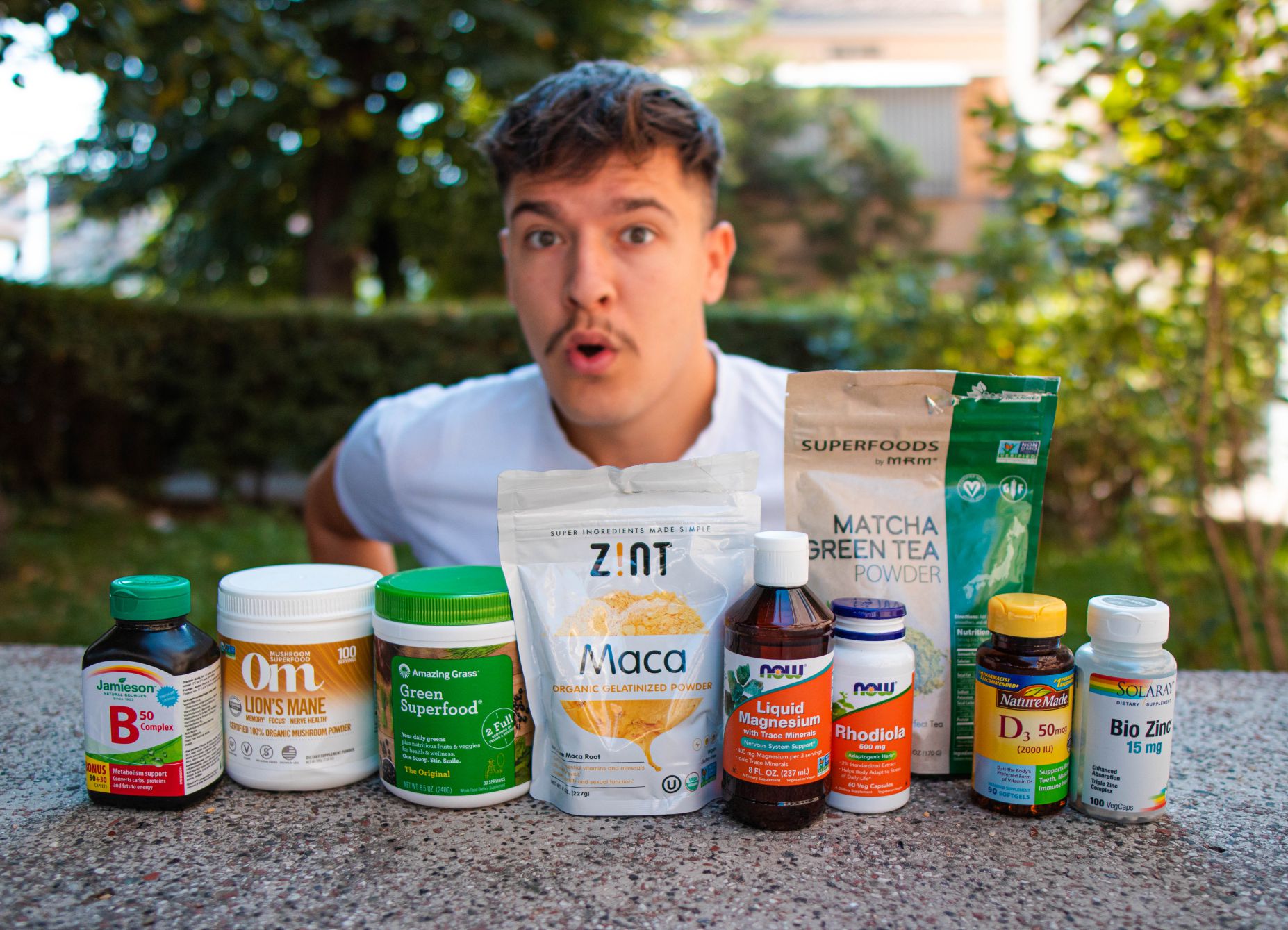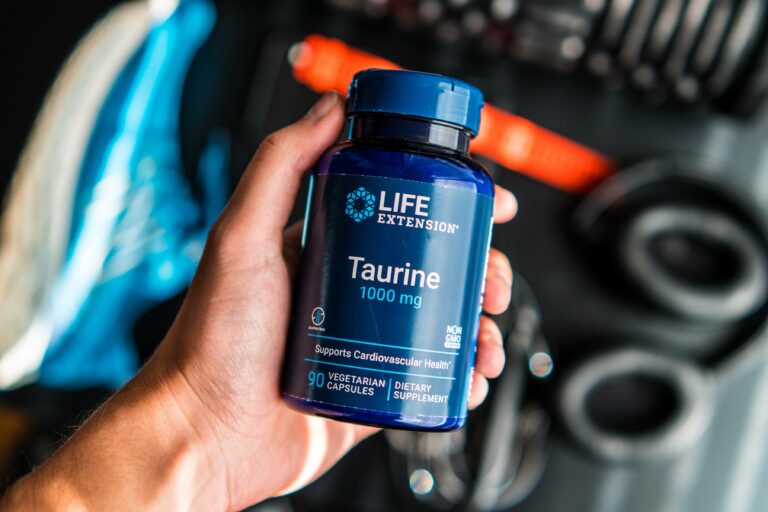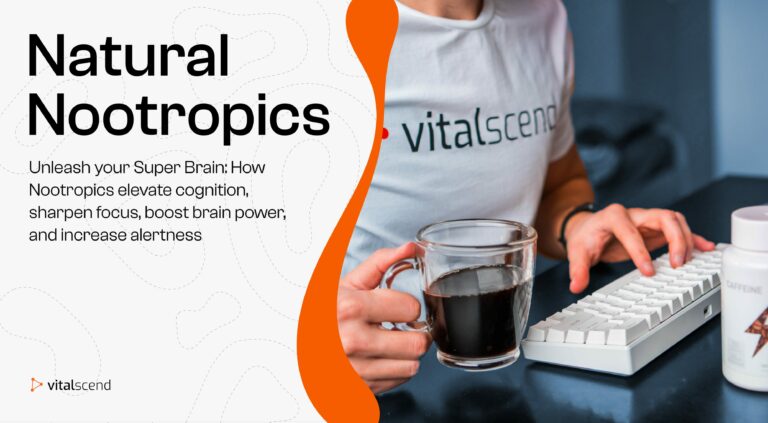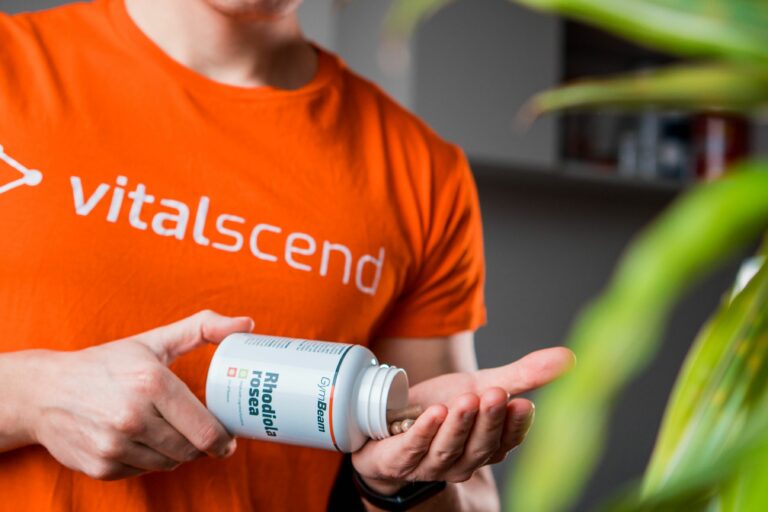Nootropic Stack to Elevate Cognitive Performance
Having a sharp brain helps you navigate the world better and achieve your goals faster. Elevating cognitive performance helps with various domains, be it productivity, movement, or creativity.
There’s more to enhancing brain function than popping a few nootropics. However, if you build your brain with the right nutrients, it will function smoother.
We’ll discover the key, scientific-backed nootropics that help within many areas of cognitive function such as memory, attention span, focus, and reaction time. Consider these to be your natural weapons to modulate brain physiology, impacting mood, focus, and even neuroplasticity.
How the Brain Works
The brain is the most complex organ in the human body comprised of billions of neurons. These specialized cells transmit information through electrical signals via a large network of synapses, with the help of chemical messengers or neurotransmitters.
These processes are essential for sustaining life. They impact movement, eating, sleeping, thinking, and running all the necessary physiological processes our body needs to survive.
Brain Health and Cognitive Performance
Improving brain health directly enhances cognitive function. Many neurodegenerative diseases don’t just pop off, they develop. To an extent, how good one cognitive function is tells a lot about their brain health.
Let’s imagine we put cognitive function on a spectrum, from poor to great. Those with poor cognition have lower attention span, weaker focus, and inability to memorize things. Such brain dysfunction is linked to neurodegeneration. On the other hand, someone with a sharper brain, who can learn faster, memorize better, or react quicker, is moving further up the brain health curve.
In a way, improving brain health is improving cognitive function. In looking to optimize it, we mainly look at cognitive abilities or domains of cognition like
- focus & attention → our ability to maintain the flow of thoughts in a specific area and recall all relevant information for longer, filtering our distraction.
- learning & memory → learning is the acquisition of knowledge or skills, while memory is the ability to encode, store, and recall information.
- mood regulation & stress → ability to monitor, evaluate, and modulate one’s emotions, and responses to internal or external stimuli.
- executive function → the CEO’s superpower. It encompasses higher-level cognitive tasks like planning, problem-solving, fast reaction, goal-setting, and self-regulation.
Fun Fact
Brain health and brain function are correlated. Healthier brains can function more efficiently. There’s more oxygen flow in the brain, better neurotransmitter balance, and higher conductivity.
The Overlap → One Nutrient helps in many areas
One of the key challenges is categorizing nutrients as being beneficial for specific domains like focus, memory, or inflammation. Unlike pharmaceuticals which target single pathways, many natural nootropics tend to have multifaced effects. And oh, there isn’t a one-size-fits-all, perfect nootropic stack. Individualization matters, these are just some compounds to consider, when building your nootropic stack.
For instance, omega-3 fatty acids can exert anti-inflammatory effects, which can also improve the domains of memory and focus. Enhancing brain blood flow directly impacts neurotransmitter levels which affects mood. Modulating brain activity with L-theanine helps sustain alertness and reduce stress., etc.
This overlapping benefit across various aspects of brain health complicates the task of neatly categorizing nutrients into distinct domains. So, take categorization, anywhere, with a grain of salt. Speaking of salt, electrolytes are great for the brain.
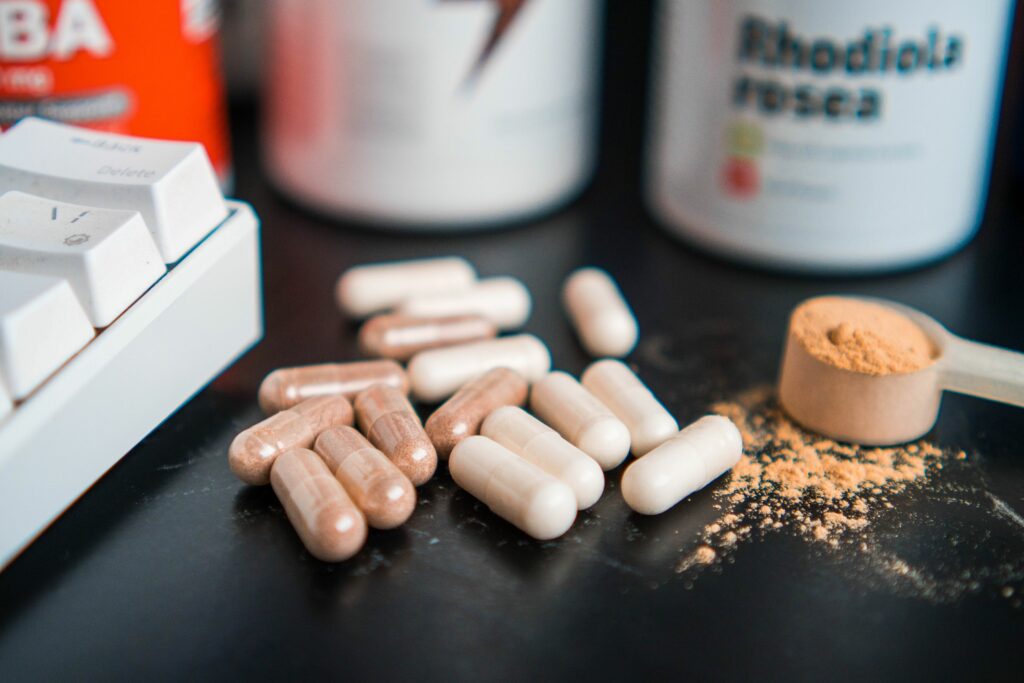
Enhance Brain Function → Natural Nootropics
In enhancing brain function, we’re interested in
- quality tissue → building a healthier, higher quality, fatty brain
- brain energy → optimizing the machinery that creates energy in the brain
- neurotransmitter modulation → maintaining a good ratio (balance) of chemical messengers
- neuroprotection → reducing inflammation, toxins, and junk compounds in the brain
- neuroplasticity → maintaining an adaptable, plastic brain
Brain Tissue Quality
Omega 3 Fatty Acids
Omega 3 fatty acids are essential healthy fats found in seafood, nuts, and plant oils. They’re the building blocks of a healthy brain.
Particularly, DHA and EPA are considered essential components of cell membranes important for maintaining brain quality, particularly white matter mass, which we lose with age. (1) (2) They also support brain blood flow and can exert anti-inflammatory effects. (3) (4)
Increasing omega-3 intake improved learning, memory, well-being, and blood flow in the brain, as analyzed in 9 RCTs with 1319 participants in total. (5) It’s evident that increasing omega-3 intake can help improve brain health and function.
Energy Levels
B-vitamins
B vitamins are essential for energy metabolism in the brain. They help convert food into energy, providing the brain with the fuel it needs. Some B vitamins, particularly vitamin B6 are crucial for synthesizing neurotransmitters like dopamine, serotonin, GABA, noradrenaline, and melatonin. (6)
Thiamin (B1), vitamin B6, and Cobalamin (B12) are also key cofactors in myelin synthesis, the protective sheath around the nerves, brain, and spinal cord. B12 deficiency is linked with fatigue, tingling, weakness, and numbness. (7) (8) (9)
Creatine
Creatine provides a source of fast energy for the body. Due to its ability to attach water, it has earned its place in the muscle-building industry. However, more and more scientists are beginning to recognize its positive effects on cognition.
For energy production to run smoothly, even at a cognitive level, we need fuel. ATP is the main one, and CrP or phosphocreatine helps regenerate ATP [adenosine triphosphate] faster, providing a phosphate to ADP [adenosine diphosphate].
Supplementing with creatine has been shown to improve cognitive function, enhance memory, and reduce mental fatigue, especially during times of increased stress or sleep deprivation. (10) (11) (12) (13)
Acetyl-L-Carnitine
Acetyl-L-carnitine (ALCAR) is an amino acid derivative that plays a crucial role in cellular energy metabolism and neurotransmitter synthesis. It assists the transport of fatty acids into the mitochondria, thus enhancing energy [ATP] production at a cellular level.
It also has certain antioxidant, and anti-inflammatory effects which protect cells from oxidative damage. (14) This is important for neuroprotection, as a cleaner brain means maintaining cognitive function for longer.
ALCAR may improve focus, attention, mood, and cognitive function, particularly in individuals experiencing cognitive decline or neurodegenerative disorders. (15) (16) (17)

Focus, Attention & Learning
Before diving deep, let’s make it clear. Synthetic nootropics [modafanil, ritalin] work fast and seem very effective. They flood the brain with dopamine. The drawback is addiction and withdrawal symptoms.
Elevating cognition sustainably, and long-term has nothing to do with synthetic drugs. It’s about building a fundamentally healthy brain. Modulating focus this [natural] way is slower, healthier, and better.
Caffeine
The most widely researched natural stimulant that increases focus and attention. Caffeine blocks the adenosine receptors, due to its similar structure to adenosine, which signals fatigue. This fatigue-repressing effect stimulates our nervous system, enhancing focus.
Moderate caffeine consumption has been associated with improved cognitive function, including faster reaction times, enhanced vigilance, and better learning and memory retention. (18) (19) (20)
When constantly consumed, caffeine degrades in efficiency. Caffeine cycling is a great strategy to prevent this and get the cognitive boost you need. It’s a strategy that involves deliberate abstinence from caffeine, such as drinking it 5 and skipping it 2 days a week.
Fun Fact
The well-known coffee and cigarette combo as a cognitive boost works because of caffeine and nicotine. The new biohacker way to do this is drinking clean coffee [potent in caffeine] adding n-theanine and nicotine gum. While better than cigarettes (filtering out toxic chemicals) nicotine gum is still addictive and not recommended.
Choline
Choline is found in foods like liver, eggs, and soybeans. Optimal levels are important for synthesizing acetylcholine [ACH], a key neurotransmitter that helps our cognitive engines run smoother. It plays a major role in learning, memory, attention, and arousal. (21) (22) (23)
Optimal levels of ACH mean our brain is ready for action. Effective ways to increase acetylcholine levels in the brain are supplementing with alpha-GPC and citicoline.
Memory
Improving memory is tied to enhanced focus and learning, as these two are the prerequisites for storing information. No magic pill improves memory, however, certain compounds have shown potential, particularly in those with poor memory or age-related cognitive decline.
Gingko Biloba
Gingko Biloba is one such adaptogen believed to enhance memory recall, due to its pro-cholinergic effect. It contains bioactive compounds like flavonoids and terpenoids which act like antioxidants. Additionally, it can enhance blood flow in the brain, thus potentially enhancing memory and cognition. (24) (25)
Ginkgo extracts have been used for neurodegenerative conditions like Alzheimer’s and dementia, due to their therapeutic properties. (26) (27)
Fat-soluble vitamins (A, E, D & K)
Fat-soluble vitamins, including vitamins A, D, E, and K, play essential roles in brain health and cognitive function.
- Vitamin A is involved in neurogenesis and the formation of synaptic connections in the brain, supporting memory formation and learning.
- Vitamin D regulates neurotransmitter synthesis and modulates neuroplasticity, contributing to memory consolidation and retrieval.
- Vitamin E acts as an antioxidant, protecting brain cells from oxidative damage and supporting cognitive function.
- Vitamin K plays a role in myelination and the synthesis of sphingolipids, essential components of brain cell membranes.
Adequate intake of fat-soluble vitamins through diet or supplementation can help support memory function and overall brain health. Foods rich in vitamins A, E, and D include dairy, eggs, seafood, fish, and liver, while green leafy vegetables are rich in vitamin K.
pro tip
Most common memory-enhancing supplements include choline, curcumin, omega 3, ashwagandha, Lion’s Mane, Bacopa Monnieri, and phosphatidylserine.
Neuroprotection
Protecting the brain relies on preserving brain cells’ function and structure. We do this by training and nourishing our brains, by learning new skills and eating the right nutrients.
Effective neuroprotection relies on reducing oxidative damage, inflammation, toxins, and plaque build-up. This is done by improving brain blood flow and increasing antioxidant intake.
Lion’s Mane Mushroom
It is a medicinal mushroom with potent neuroprotective and cognitive-enhancing properties. Its bioactive compounds may increase BDNF and NGF, important neurotrophic factors that play an essential role in the growth, development, and maintenance of neurons in the brain and nervous system. (28) (29) (30)
Like other adaptogenic mushrooms, like Cordyceps, Reishi, and Chaga → Lion’s mane is considered neuroprotective. Specific compounds in those mushrooms help modulate the immune system and protect the brain from oxidative stress.
Most of the collected data confirms the neuroprotective and nootropic effects of Lions Mane mushroom. However, it’s important to note that most of the experiments are done on animal models. (31) (32) (33)
Phosphatidylserine
PS is a phospholipid that plays a crucial role in maintaining neural integrity and fluidity of cell membranes. It is abundant in neural cell membranes and assists with neurotransmitter release, synaptic function, and transmitting nerve signals.
Phosphatidylserine is a potent antioxidant that helps modulate neuroinflammation (34) and supports neuroplasticity.
Higher DHA levels in the brain are linked to PS accumulation, both considered important agents in brain development and neuroprotection. (35) (36)
It can help in various domains of cognition but is particularly helpful in assisting with memory in people with impaired cognitive function, or age-related cognitive decline. (37) (38)
Curcumin
An active compound found in turmeric, a well-known spice that has anti-inflammatory and antioxidant properties. (39)
Curcumin has been shown to modulate various molecular pathways involved in neuroprotection. It may assist in reducing oxidative stress, neuroinflammation, and promoting neurogenesis. (40)
Research shows that curcumin may assist in improving working memory and processing speed. (41)
Due to its neuroprotective effects, it has been used as a preventive agent for neurodegeneration and cognitive decline. Some studies highlight its potential to reduce plaque accumulation and inflammatory cytokines, which are important for preserving brain health. (42) (43)
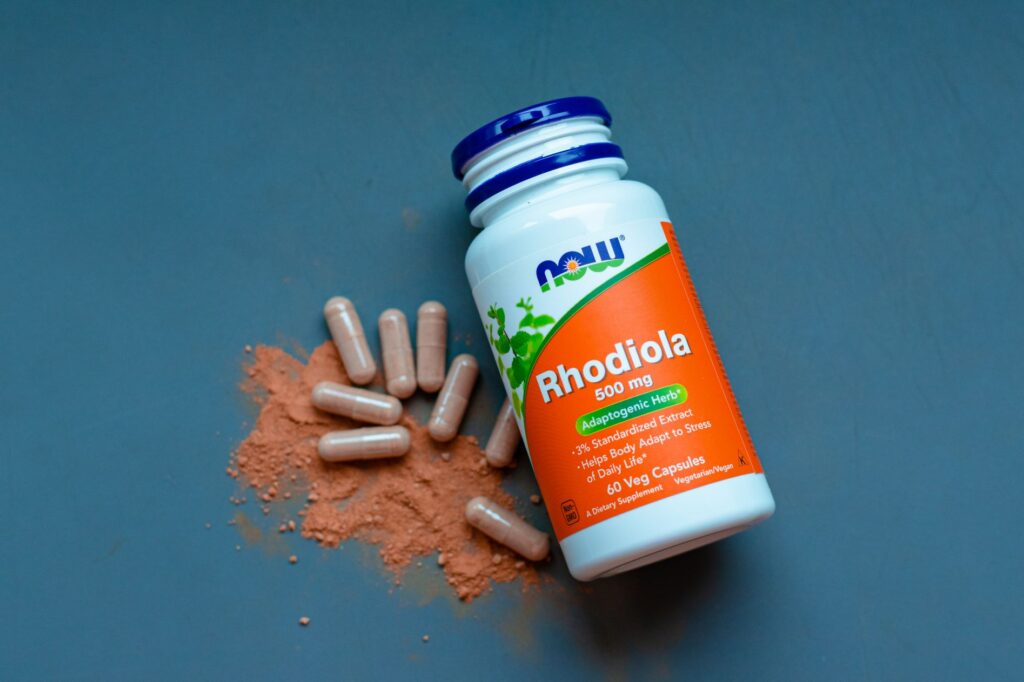
Stress-Relief & Mood
Reducing hyperactivity and chronic stress is beneficial for health. Certain herbs, by modulating key neurotransmitters in the brain can help relieve stress.
L-theanine
It is an amino acid found in tea, particularly green tea. L-theanine is responsible for the calming and soothing effects of tea. It is believed to increase GABA, a key inhibitory neurotransmitter in the brain.
Getting our hyperactivated brain to slow down by transitioning to an alpha state is what L-theanine is all about. (44) (45) This helps us develop a state of relaxed alertness and mental clarity.
Due to the common overstimulation effect of many nootropics, this has been gaining popularity because it increases alertness, without making us sleepy and drowsy. It’s been heavily used by biohackers, in combination with caffeine to soothe the jitters, hyperactivity, and energy crashes, while extending our focus.
Research suggests L-theanine has a strong potential to promote mental health, reduce stress, and improve cognitive function, particularly under stress. (46) (47)
Rhodiola Rosea
As with many adaptogens, Rhodiola introduces a light stressor that helps the body become more resilient to stress. It modulates the HPA axis which is responsible for the secretion of stress hormones like cortisol.
Rhodiola is amongst the most researched adaptogens in the scientific literature. Due to some of its bioactive compounds and polyphenols, it has been show to modulate stress and promote emotional well-being.
It can modulate neurotransmitters like serotonin and dopamine, important for mood. This is why it has been used to reduce symptoms of stress-related fatigue, burnout, anxiety, and depression. (48) (49) (50) (51)
Other factors – sleep, stress, exercise, cognitive work
As we’ve outlined before, cognition is a complex subject. While natural supplements can help optimize the brain’s physiology, elevating cognitive function should rely on more than just popping a few pills.
Other factors that help enhance cognitive function include
- mood → sun exposure and sufficient vitamin D levels
- focus → removing distractions, relying on commitment, not motivation
- memory → smart games, puzzles, chess, and sudoku
- stress-relief → deep breathing, cold exposure, active breaks
- neuroplasticity → always learning new information, acquiring new skills
- neuroprotection → exercise, seafood, reduced exposure to Bluetooth, 5G’s, etc.
We’re not going to become brainiacs with just a few nutrients, at least not sustainably. It’s about a wider approach, optimizing all factors that contribute to elevating cognition. However, knowing how and why certain supplements work helps us use them in the right context. By modulating key neurotransmitters (at the right time) we can focus sharper, think clearer, and memorize better.
Conclusion
- Nourishing the brain with the right nutrients can significantly impact cognitive function, supporting memory, focus, mood regulation, and overall brain health.
- Improving brain health links to greater cognition. Building a quality, fatty brain and optimizing its energy-creating machinery is key. This is where B vitamins, Creatine, Omega 3 FA’s, and ALCAR can help.
- Improving mood and reducing stress is about modulating key neurotransmitters like dopamine, serotonin, and GABA. The key adaptogens for stress management are ashwagandha, rhodiola rhosea, and L-theanine.
- Focus, learning, and memory are all interconnected. Caffeine and choline can help increase focus and learning, while fat-soluble vitamins (A, E, K, D) are essential for memory.
- Neuroprotection is about reducing oxidative damage and plaque build-up in the brain. This is where powerful antioxidants like Curcumin, Resveratrol, Lion’s Mane, and Phosphatidylserine can play a role.

